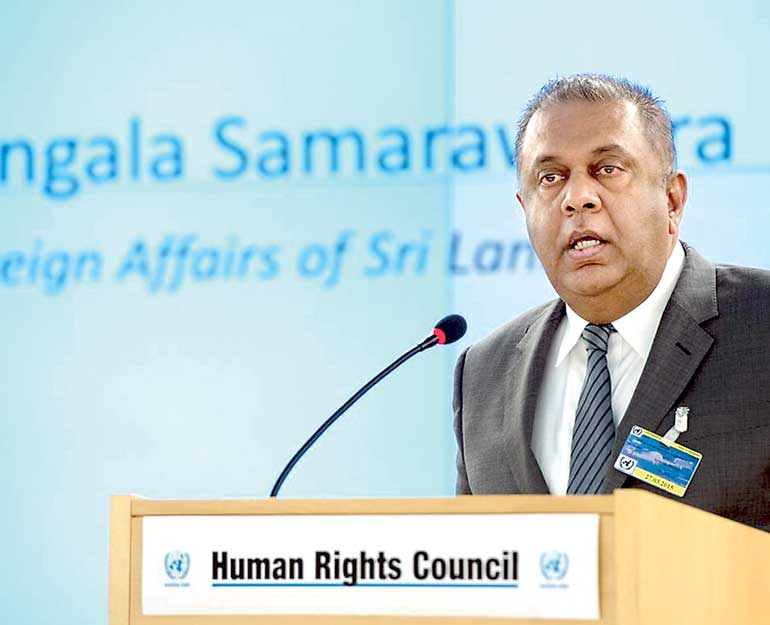Friday Feb 13, 2026
Friday Feb 13, 2026
Saturday, 19 September 2015 01:11 - - {{hitsCtrl.values.hits}}

Mangala Samaraweera, Minister for Foreign Affairs, Sri Lanka addresses during the High Level Segment of the 28th Session of the Human Rights Council, Palais des Nations. Monday 2 March 2015. Photo by Violaine Martin
Dr. Dayan Jayatilleka has chosen to express his displeasure over Foreign Minister Samaraweera’s address in Geneva by invoking an expletive in a film script attributed to a character Detective Bunk. The noun is indeed an adjective and an amplifier of his fulmination.
It is with reluctance that I probe his dissent in to cynical zealotry.
“The dismantling of Sinhala power and the ushering in a federal system has been outsourced to the UNP and Chandrika Kumaratunga.” Dayan Jayatilleka in [5 May Parliamentary Elections – Real Stakes] 
“Across the island’s heartland where millions live, the masses have carried Mahinda back to the centre stage of politics. What a comeback it has been, in just six months?” [11 July 2015 Understanding the Sirisena Shift]
Dr. Dayan Jayatilleka made the two pronouncements in the space of three months. The first after the defeat of President Rajapaksa on 8 January. In it he regards the Chandrika-Ranil alliance as a prelude to the dismantling of Sinhala power. The second ecstatic chortling after the ‘Nugegoda rising’ ended with the galvanic snatch by Mahinda Rajapaksa his UPFA nominations for the Parliamentary elections.
The failure of the Buddhist Bonapartist Parliamentary putsch of 17 August compels him to appropriate a selected part of our colonial encounter. Explaining the Mahinda Movement and Sinhala Nationalism, 10 days later on 28 August, he says:
“The main reference point of the Mahinda Movement’s public discourse after 8 January was not the 5.8 lakhs of voters, but rather the marker year 1815, the year of the betrayal of Sri Wickrama Rajasinghe who had successfully resisted the colonial incursion of 1810. 1815 was the year of the Kandyan convention which sealed the surrender of the whole island to Western colonialism.”
This is selective appropriation of history to read present cleavages into the past. The onset of European colonialism created intra group rivalries that have no relevance to contemporary construction of nationalism or sovereignty. Projecting group identity disparaging the ‘other’ in terms of sovereignty and nationalism is a 19th century phenomenon.
Two hundred and thirty five years earlier puppet King Dharmapāla had donated his kingdom in Kotte to the king of Portugal. Konappu Bandara also known as Don Joao of Austria entered the Kandyan Kingdom with a Portuguese expedition, turned against the Portuguese and claimed the throne of Kandy.
He married Dona Catherina – Kusumasana Devi who had the strongest claim to the ‘Udarata’ throne. She practiced her Catholic faith until her death, cloistered in the palace as Queen to the first consecrated King of Kandy. His successor King Senarath signed a treaty with the Portuguese who recognised him as the ruler of Kandy. The Kandyan kingdom had thus reached a détente with the Portuguese.
Beginning with King Vimaladharmasūriya, King of Kandy (1591-1604), the Kandyan kingdom became a place that provided a home for diverse cultures and communities – a cosmopolitan society. As the eminent Pakistani born historian has noted before, the colonial encounter a web of “economic and social linkages had survived periods of imperial consolidation, crisis and collapse bound the subcontinent into a loosely-layered framework of interdependence”. This island is a continental island.
He says that the Minister of External Affairs took a sideswipe in his speech at the concept of “sovereignty”. Dr. Dayan Jayatilleka is entitled to his version of Sinhala nationalism and what he calls Sinhala power. His attempt however to read the present in to the past and reconstruct a homogenous Sinhala sovereignty is a fatuous frolic in neo realism.
Why do I say it? Because Dr. Dayan Jayatilleka knows what went wrong. Writing in February 2013 he tells us how we took the wrong turn. According to him, the failure of successive administrations to do a surgical strike similar to what President Obama did to Osama Bin Laden in eliminating Prabhakaran had opened the door for a neo-conservative populist backlash. That backlash brought into office a leadership team that got the job done.
“Now we have the morning after, and all the ideas contained in the social coalition that supported the populist neo-conservative project are now bubbling to the surface. Ideas on culture, on women, on Muslims, on Tamils, on Christians, on devolution, on universality—the whole ideology of the so called home-grown – all of these are now bubbling to the surface.”
Dr. Dayan Jayatilleka who upbraids Foreign Minister Samaraweera for making a blatantly partisan speech in Geneva in 2013 is on record on the trajectory followed by the Rajapaksa monolith. Sri Lanka is not the only place where it happened. The gerrymandering of the Judiciary he compares to the inept bungling of George Bush and the power shift to Cheney and Rumsfeld and the attempts to re-tool the legal system under Alberto Gonzales, the Attorney General.
Why does Dr. Dayan Jayatilleka insist on being branded as a political chameleon? Because as Martin Heidegger did in Nazi Germany he regards truth as “the revelation of that which makes a people certain, clear, and strong in its action and knowledge”. It is a Faustian bargain. It is with great sadness that I compare him to Martin Heidegger who described the Holocaust to factory farming, a symptom of the modern condition rather than a specifically German crime.
The comparison has an interesting parallel. Martin Heidegger addressed an election rally held by German University Professors in Leipzig in support of the plebiscite on 12 November 1933 after Germany’s withdrawal from the League of Nations. The quote is lengthy. But it explains.
German teachers and comrades!
The will to a true national community (Volksgemeinschaft) is equally far removed both from an unrestrained, vague desire for world brotherhood and from blind tyranny. Existing beyond this opposition, this will allows peoples and states to stand by one another in an open and manly fashion as self-reliant entities (das offene und mannhafte Aufsich und Zueinanderstehen der Volker und Staaten). What is it that such a will brings about? Is it reversion into barbarism?
No! It is the averting of all empty negotiation and hidden deal-making through the simple, great demand of self-responsible action. Is it the eruption of lawlessness? No! It is the clear acknowledgement of each people’s inviolable independence. Is it the denial of the creative genius of a spiritual (geistig) people and the smashing of its historical traditions? No! It is the awakening of the young who have been purified and are growing back to their roots. Their will to the State will make this people hard towards itself and reverent towards each genuine deed.
What sort of event is this then? The nation is winning back the truth of its will to existence, for truth is the revelation of that which makes a people confident, lucid, and strong in its actions and knowledge. To be knowing, however, means: to be master of things in clarity and to be resolved to action.
It is a sorry spectacle to see a mind full of promise fall for a Faustian bargain.